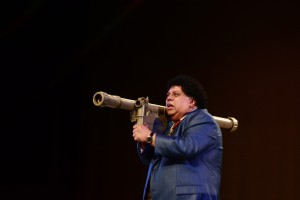Last fall, when I joined the Dramatist Guild Institute’s play writing workshop, I was told the objective of this class would be for each participant to write a first draft of a full length play. I was thinking what would be a good topic to write about. And then it dawned on me, the story of “The Curious Case of a Casual Terrorist” would be the perfect vehicle to try out. I have been following this bizarre story of an international salesman, who of his own will, fell into a trap set up by the law-enforcement to nab terrorists before they could act. The story, that unfolded in New Jersey about fifteen years ago, caused a huge media storm. The strangeness of this story made it a household topic of discussion, while the law enforcement touted it as their greatest success. I thought about the possibility of a play based on this true story right then, but couldn’t get to it. There were other issues too. Finally, at the end of the ten weeks workshop the play that evolved in its first draft form was not the true story itself, but a fictionalized drama highlighting the irony and absurdity of it all. The play, after its first draft, went through several rounds of revision. I had to make major changes even after the rehearsals began. Although the central spine of the story remained unchanged. I believe, a play is not a mere reporting of a story. It has to be more than that. It has to go inside the mind of the characters and explore their motives. The playwright, and subsequently the actors and the audience, needs to get a feel (if not understand) of what made the characters do what they did. Sub-stories are created, relationships established, and moment by moment a play takes place when it transcends beyond the original story.
Some people classify this play as a political drama. But is it really? Lee Blessing, a famous playwright, once said, “I think all theater is political, it’s just that some plays are a little more conscious of it than others. It seems a curiously American point of view to think that there is a ‘private’ life that is completely divorceable from a ‘public’ one. Everything we eat is the product of a political system. The worth of our houses turns out to be a very volatile product of a political system. The clothes on our back, the gas in our cars- it’s ubiquitous. Everything we do, think or say is done in the context of a political system. Political battles are fought in every sphere of our lives: cultural business, aesthetic, religious, filial, romantic – you name it. Even choosing to ignore politics completely is, at base, an intensely political decision.”
Having said that, the so-called genre of “political play” are those which take a political stand and subscribe to some form of political agenda. The Curious Case…” doesn’t do such a thing. It does not make a political statement, neither does it criticize any political belief or policy, either right or left. Rather this play can be thought of as a court room drama, without the customary set of a court room. In this play, the audience performs the role of the jury. And before this jury, the actors present the case of “Basant Adnani” the alleged terrorist. We want the audience to come in with an open mind, watch the play, and then decide if Basant Adnani is guilty or not-guilty. If you can leave your biases aside and participate in this process objectively using your common sense and your values as a compassionate human being, I believe you’ll reach the correct verdict without much effort.
See you at the theatre.

